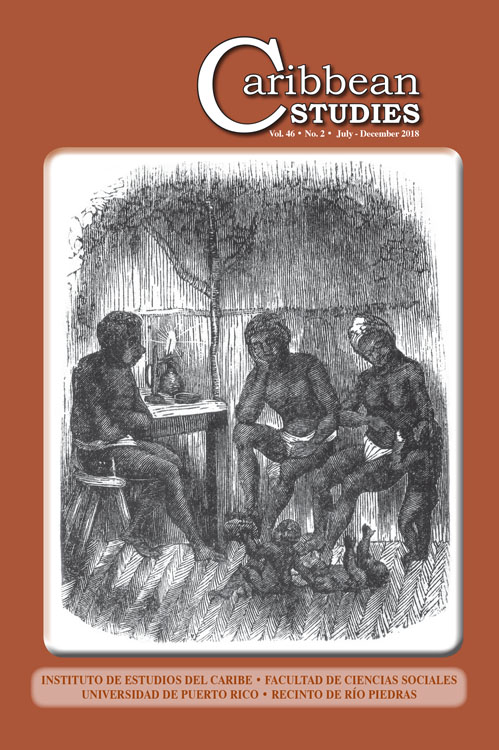Abstract
At the centre of the Jamaican Poor Relief Administration were Inspectors of Poor [sic], appointed to monitor and administer relief
to applicants throughout the island. Acting on behalf of the Board of Supervision and the Parish Councils, these civil servants protected the financial interests of the government while also representing the needs of applicants for relief. Many Inspectors of Poor, through their daily interactions, developed criteria of poverty through which they were able to identify those whom they thought took advantage of the loopholes in the system. In May 1932, Acting Inspector of Poor, Mr. D. Phillips alerted the Town Clerk of the Kingston and St. Andrew Corporation of his encounter with two women who attempted to defraud the Poor
Relief Office. Using poor relief records of the Kingston and St. Andrew Corporation, I explore conflicts between poor relief officers and paupers, more specifically women, to assess the ways in which women engaged and navigated the bureaucracy of the poor relief system. I contend that women on poor relief operated in communities through which they shared their aid and navigated the complex bureaucracy of the Jamaican poor relief system. In addition, I argue that poor relief records are a rich archival source from which we can engage emerging areas of research such as poverty, family, and childhood.
References
Bolland, O. Nigel. 1995. On the March: Labour Rebellions in the British Caribbean, 1934-39. Kingston, Jamaica: Ian Randle Publishers.
Brodber, Erna. 1986. “The Pioneering Miss Amy Bailey.” Jamaica Journal 19 no. 22, pp. 9-14.
Bryan, Patrick. 2002. Philanthropy and Social Welfare: An Historical Survey. Mona, Jamaica: Sir Arthur Lewis Institution of Social and Economic Studies.
———. 2000. The Jamaican People 1880-1902: Race, Class and Social Control.
Barbados, Jamaica and Trinidad: University of the West Indies.
Carter, Henderson. 2012. Labour Pains: Resistance and Protest in Barbados 1838- 1904. Kingston, Jamaica: Ian Randle Publishers.
Carter, Richard. 1991. “The Almshouse Test: Deterring the Poor Under the 1880
Poor Relief Act.” Seminar Paper 1, 1990-1991. Department of History, Cave Hill Campus, Barbados.
De Barros, Juanita. 2014. Reproducing the British Caribbean: Sex, Gender, and Population Politics after Slavery. Chapel Hill: University of North Carolina Press.
Eisner, Gisela. 1961. Jamaica 1830-1939: A Study in Economic Growth. England: Manchester University Press.
Fletcher, Leonard. 1992.”The Evolution of Poor Relief in Barbados 1838-1900.” Journal of Caribbean History 26(2):171-209.
Fox-Piven, Frances and Richard Cloward. 1971. Regulating the Poor: The Functions of Public Welfare. New York: Vintage Books.
French, Joan. 1988. “Colonial Policy towards Women after the 1938 Uprising:The Case of Jamaica.” Caribbean Quarterly 34(3-4). Women in West Indian Literature II, pp. 36-61.
Gregg, Veronica Marie. 2007. “How with this rage shall beauty hold a plea”: The Writings of Miss Amy Beckford Bailey as Moral Education in the Era of Jamaican Nation Building.” Small Axe 23 (vol. 11 no. 2) pp. 16-23
Hart, Richard. 1992. “Origin and Development of the Working Class in the English-Speaking Caribbean Area: 1897-1937. In Labour in the Caribbean, edited by Malcom Cross and Gad Heuman. London: Macmillan Caribbean.
Jamaica Archives, Spanish Town. 1924-1938. Public Local Records Records of the Kingston and St. Andrew Corporation including Minutes of the Corporation Poor House Committee (2/6/171-397).
Jamaica. 1921-1938. Reports of the Board of Supervision in the Annual Report of Jamaica together with Departmental Reports. Duke Street, Jamaica: Government Printer.
Jamaica. 1938. Report of the Committee on Poor Relief and the Management of Poor Houses in Jamaica. Kingston, Jamaica: Government Printing Press.
Jemmott, Jenny. 2015. Ties that Bind: The Black Family in Post-Slavery Jamaica 1834-1882. Jamaica: University of the West Indies Press.
Jones, Cecily. 2007. Engendering Whiteness: White Women and Colonialism in Barbados and North Carolina 1627-1865. Manchester, England: Manchester University Press.
Jones, Margaret. 2013. Public Health in Jamaica 1850-1940: Neglect, Philanthropy and Development. Jamaica, Barbados, Trinidad: University of the West Indies Press.
Lobdell, Richard. 1988. “Women in the Jamaican Labour Force, 1881-1921.”Social and Economic Studies 37(1-2):203-240. Caribbean Economic History, pp. 203-240.
Mohammed, Patricia, and Catherine Shepherd, eds. Gender in Caribbean Development. UWI Women and Development Studies Project. Jamaica, Barbados and Trinidad: Institute of Social and Economic Research, Reprinted 1991.
Macmillan, William. 1971. Warning from the West Indies: A Tract for Africa and the Empire. Freeport, New York: Books for Libraries Press, 1936. Reprinted 1971.
Moore, Brian, and Michelle Johnson. 2004. Neither Led Nor Driven: Contesting British Cultural Imperialism in Jamaica 1865-1920. Barbados, Jamaica and Trinidad: University of the West Indies Press.
Post, K.W.J. 1969. “The Politics of Protest in Jamaica, 1938: Some Problems of Analysis and Conceptualization.” Social and Economic Studies 18(4):374-390.
Simey, T.S. 1946 Welfare and Planning in the West Indies. Oxford: Clarendon Press.
Speirs, Janet. 1999. “Poor Relief and Charity: A Study of Social Ideas and Practices in Post Emancipation Jamaica.” MPhil History, University of the West Indies Mona, Jamaica.
The National Archives, Britain. Colonial Office Series 137 Jamaica, “Governors” Correspondence, Public Offices and Miscellaneous and Individuals.
The National Archives, Britain. Colonial Office Series 950 West India Royal Commission, 1938-1939.
Vassell, Linette. 1998. “Colonial Gender Policy in Jamaica.” Pp. 190-201in Before and After 1865: Education, Politics and Regionalism in the Caribbean, edited by Brian Moore and Swithin Wilmot. Jamaica: Ian Randle Publishers.

